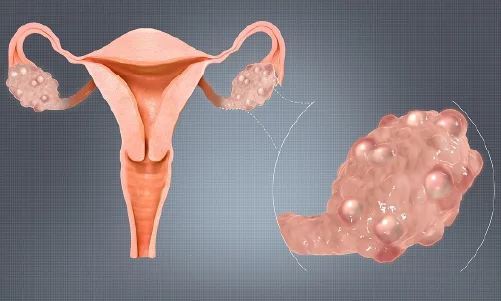Polycystic Ovary Syndrome (PCOS) is a hormonal disorder affecting reproductive-aged women, characterised by irregular periods, excess androgen levels, and polycystic ovaries. Its treatment addresses infertility, insulin resistance, acne, and hirsutism.
If you're considering treatment for PCOS, reach out to us or book a direct appointment with our gynaecologist.At the CK Birla Hospital, we are dedicated to ensuring that your PCOS treatment is as safe, comfortable, and effective as possible. We're here to guide you every step of the way toward a successful recovery.

The precise origin of PCOS remains unidentified, however, there are several factors which may play a role in causing it, such as:
Androgens
Higher levels of male hormones (androgens) disrupt ovulation, which leads to irregular menstrual cycles. Androgens also cause acne and excess hair growth.
Insulin Resistance
Increased insulin levels prompt ovaries to produce androgens. This suppresses ovulation and worsens PCOS symptoms.
Insulin helps regulate glucose levels for energy. Insulin resistance, common in PCOS, affects glucose processing. Elevated insulin levels can signal insulin resistance and may lead to diabetes, particularly in those with obesity.
Low-Grade Inflammation
PCOS often involves chronic low-grade inflammation. Blood tests help to measure C-reactive protein (CRP) and white blood cells. Elevated levels indicate increased inflammation.
Polycystic ovary syndrome (PCOS) entails various health risks if untreated, like:
Timely treatment, involving lifestyle changes, medications, and fertility treatments, mitigates symptoms, lowers complications, and enhances quality of life. Close collaboration with healthcare providers is crucial for personalised care.
Polycystic ovary syndrome (PCOS) manifests in these types:
Your healthcare provider will customise treatment based on various factors such as symptoms, medical history, and pregnancy plans. Treatments may involve:
For those not planning pregnancy
For those Aiming for Pregnancy
In most cases, PCOS diagnosis involves an examination and symptom discussion. Healthcare providers conduct blood tests and ultrasounds for diagnosis support. Your healthcare provider will:
These steps ensure tailored care and maximise treatment effectiveness while minimising risks. Open communication with healthcare providers is crucial for optimal PCOS management.
The cost of a PCOS treatment varies as per the specific type of treatment advised by a healthcare provider, such as:
Hormonal birth control
Medications (Insulin-sensitising, androgen-blocking and ovulation-inducing)
Surgery
In vitro fertilization (IVF)
The cost can also vary widely depending on several factors, including the location, the extent of the treatment, the doctor’s experience, and the hospital’s pricing structure.
To get an explicit estimate for the cost of a PCOS treatment at the CK Birla Hospital, contact the hospital directly. Additionally, you can consult with our board-certified gynaecologist to discuss your specific needs and receive a personalised quote for the treatment.
PCOS stands for Polycystic Ovary Syndrome. It’s a hormonal condition that affects many fertile women. It may cause infrequent or prolonged menstrual periods, excess hair growth, acne, and obesity.
Symptoms may include irregular periods, heavy bleeding, excess hair growth (hirsutism), acne, weight gain, difficulty losing weight, and infertility. Not all women with PCOS will have all these symptoms.
Yes, PCOS is a leading cause of female infertility due to irregular ovulation or lack of ovulation. However, many women with PCOS can conceive with the help of fertility treatments.
Some studies suggest a higher prevalence of anxiety, depression, and mood disorders among women with PCOS. Managing PCOS and its symptoms, along with seeking support from healthcare professionals and therapists, can help improve mental well-being.